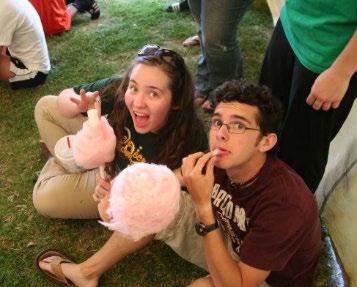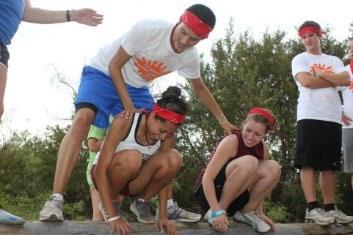
9 minute read
Parenting a College Freshman
UNIVERSITY TERMINOLOGY
A brief guide to commonly used (and often misunderstood) UniversityAcronyms, Phrases, and Miscellaneous Jargon
Advertisement
Academic Advisor – A faculty or staff member of the academic department to which a student is admitted. The advisors are available to assist students with academic counseling and scheduling of classes.
AEC – (Academic Enrichment Center) Located in the Campus Center, the AEC is the largest computer lab on campus. It also provides free tutoring in a variety of subjects.
Ala Cumba – “On To Victory!” The yell that wishes the our teams good luck for victory and shows school spirit.
Big Event – Sponsored each fall by MSG, Big Event is a day when students, faculty, and staff volunteer their time to various organizations throughout the Abilene community.
The Caf - (Cafeteria) This is the Village Market, the dining hall, where the students eat, meet to socialize, and hang out.
CAB – (Campus Activities Board) CAB works to provide many activities and entertainment that is usually free to students. This organization is open to all students.
Credit Hour – Value placed on a course used in computation of GPA and generally accepted amount of classroom/lab contact time.
GPA – (Grade Point Average) GPA is calculated by dividing the student’s grade points divided by the total number of credit hours taken during a semester. For each credit hour the student receives grade points as follows: A=4, A-=3.67, B+=3.33, B=3, B-=2.67, C+=2.33, C=2, C-=1.67, D+=1.33, D=1, D-=0.67. No grade points are assigned for grades F, I (Incomplete), or W (Withdrew). The student’s overall academic achievement is measured by dividing the sum of all quality points earned for a semester or for the student’s entire McMurry career by the sum of all credit hours attempted. The result is the GPA.
The Grille - (The Sports Grille) The campus grill where students can grab a snack or a bite to eat, visit with their friends, study, or just chill between classes. Located in the Campus Center. MSAA – (McMurryStudentAlumni Association) MSAA is an organization that is actively involved with alumni, current students and prospective students of McMurry University. The McMurry Student Alumni Association is made up of 25 students that work hand in hand with Institutional Advancement, the Alumni Office, the President’s Office, and Admission to help host Homecoming, Alumni events, the Annual Ring Ceremony, and Preview Days. All proceeds from fundraisers organized by the McMurry Student Alumni Association are donated to the Betty Gilbert Scholarship fund. Applications to join the McMurry Student Alumni Association are available at the beginning of the fall and spring semesters every year.
MSG – (McMurry Student Government) Elected students who act as a voice of the students to administration, faculty, or other organizations.
RA – (Resident Assistant) An upper-class student who lives on a floor of the residence hall. RAs are responsible for maintenance requests, enforcing residence hall rules, and are available to answer questions and assist residents.
Res Hall - (Residence Hall) One of the four places on campus where students can live. While living on the McMurry campus, students will find that their neighbors are no longer strangers—they become like family! The relationships students build will last a lifetime, and building those relationships will be one of the most fun and memorable times of their lives
Campus Ministry - is one the largest and most diverse student-led organizations at McMurry University, providing students with numerous opportunities to get involved and led by the University Chaplain and Director of Religious & Spiritual Life and Assistant Chaplain. Membership in this organization is open to all currently enrolled students. Campus Ministry hosts Chapel on Tuesdays at 11:00 a.m. in the Mabee Room, Garrison Campus Center and L.I.F.E. Lunch (Living in Faith Everyday) every Thursday @ 12:15 PM in the Village Market Meeting Room.
Slime Olympics – Teams compete in relays where you are sure to get dirty! Held during War Hawk Welcome Week.

Students at McMadness
Social Clubs – Local men’s and women’s organizations whose purpose is to provide social activities for members. Recruitment for these organizations, also called Rush, is typically held in the Spring semester. Women’s clubs include: Alpha Psi Alpha, Delta Beta Epsilon, Gamma Sigma, Pi Delta Phi, Theta Chi Lambda, and T.I.P. Men’s clubs include: Eta Epsilon Iota (HEI), Kiva, Ko Sari, Makona, and Chi Omicron (XO).
Spring Thing – MSG provides “Spring Thing” during the Spring semester of each year. Most events are free and include many enjoyable activities. Events are open to all students of the University.
Student Handbook – It includes a listing of useful offices, phone numbers, the MSG constitution, the Student Code of Conduct, and other important information.
T.I.P. Sing Song – Sponsored by the oldest women’s social club on campus, Sing Song is an opportunity for campus organizations to display their talent in singing, costumes, and choreography in a group presentation.
Wah Wahtaysee Park – The park located on the corner of South 14th
and Sayles Blvd. Events such as Slime Olympics and cookouts and other events are held in the park.
War Hawk Herald – The online student newspaper that reports current campus events and issues.
War Hawk Welcome Week –
The four-day program before school starts. It is designed to assist new students with the transition into college by helping them to make friends, and learn about organizations and services on campus.
The Zone - McMurry’s crazy student fans! The students sit together at athletic events in The Zone and cheer on the team!
Welcome Week Ropes Course PARENTING A COLLEGE FRESHMAN From a Student’s Perspective

Your student, along with two million others, is about to enter a time that is exciting; a period of joy, pain, discovery, and disappointment. These students are beginning an amazing four to five year journey. When they complete this journey they will be a different person than when they began.
And, like it or not, you’re entering this period with your son or daughter. You’ll experience the same happiness and defeats as they – second-hand, but just as vividly or achingly.
If you don’t believe me, ask my mom. She watched and waited and worried through four years of ups and downs and in-between. She patiently accepted my progressions and my regressions. She tried, and sometimes failed, to understand my way of thinking, doing, and being.
And, maybe because of her, maybe in spite of her, I left college after four years a much different person than I’d begun – a much happier person.
So, my advice is: watch and wait and worry and accept and understand. Your children will be happier for your efforts. So will Of course, no one can ensure that you’ll completely survive your child’s first year at college, but there are some guidelines that might help you make it with minimum loss of sanity and a maximum strengthening of your new relationship. The suggestions on the following pages are: a) purposely subjective; b) written by a just-graduated student who, therefore, thinks she knows everything about college, and therefore, doesn’t, and c) is based mostly on careful observations of mistakes and/or breakthroughs made by her parents and the parents of her friends.
At most, they’ll prepare you to deal effectively with some predictable first-year conflicts. At least, they’ll make you think about your reactions to them – and that can’t hurt.
Rule #1-Don’t Ask T hem If They’re Homesick
The power of association can be a dangerous thing. (A friend once told me “the idea of being homesick didn’t even occur to me, what with all the new things that were going on, until my mom called one of the first weekends and asked ‘are you homesick?’ Then it hit me.”)
The first few days/weeks of school are activity- packed and friend-jammed, and the challenge of meeting new people and adjusting to new situations takes a majority of a new student’s time and concentration. So, unless they’re reminded of it (by a well-meaning parent), they’ll probably be able to escape the loneliness and frustration of homesickness.
And, even if they don’t tell you during those first few weeks, they do miss you.
Rule #2-Write (Even if They Don’t Write Back)
Although freshmen are typically eager to experience all the away-from-home independence they can in those first few weeks, most are still anxious for family ties and the security those ties bring. This surge of independence may be misinterpreted by sensitive parents as rejection, but I’d bet that most freshmen (although 99% won’t ever admit it) would give anything for some news of home and family, however mundane it may seem to you.
There’s nothing more depressing than a week of empty mailboxes. (Warning—don’t expect a reply to every letter you write. The you-write-one, they- writeone sequence isn’t always followed by college students, so get set for some unanswered correspondence.)
Rule #3-Ask Questions (But Not Too Many)
College freshmen are ‘cool’ (or so they think) and have a tendency to resent interference with their newfound lifestyle, but most still desire the security of knowing that someone is still interested in them.
Parental curiosity can be obnoxious and alienating or relief-giving and supportive—depending on the attitudes of the persons involved. ‘I-have-a-right-to- know’ tinged questions, with ulterior motives or the nag should be avoided. However, honest inquiries and other ‘between friends’ communication and discussion will do much to further the parent- freshman relationship.
Rule #4-Expect Change (But Not Too Much)
Your student will change (either drastically within the first months or slowly over four years—or somewhere in between). It’s natural, inevitable, and it can be inspiring and beautiful. Often, it’s a pain in the neck. College and the experiences associated with it can effect changes in social, vocational and personal behavior choices. An up-to-now wall flower may become a fraternity sweetheart, a pre-med student may discover biology’s not her thing after all, or a high school radical may become a college egghead.
You can’t stop change, you may not ever understand it, but it is within you power (and to you and your student’s advantage) to accept it.
Remember that your student will be basically the same person that you sent away to school, aside from such interest changes and personality revisions. Don’t expect too much, too soon. Maturation is not an instantaneous or overnight process and you might well discover your student returning home with some of the habits and hang-ups, however unsophisticated, that you thought he/she had ‘grown out of.’ Be patient.
Rule #5-Don’t Worry (Too Much) About Manic- Depressive Phone Calls or Letters
Parenting can be a thankless job, especially during the college years. It’s a lot of give and only a little take.
Often when troubles become too much for a freshman to handle (a flunked test, ended relationship, and shrunken T-shirt all in one day) the only place to turn, write, or dial is home. Often, unfortunately, this is the only time the urge to communicate is felt so strongly, so you never get to hear about the ‘A’ paper, the new boyfriend or the domestic triumph.
In those “crisis” times your student can unload trouble or tears and, after the catharsis, return to routine, relieved and lightened, while you inherit the burden or worry.

